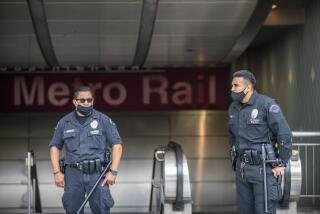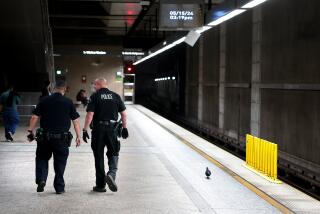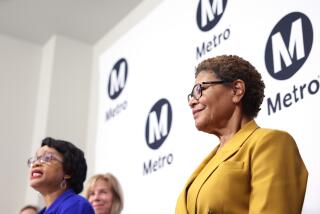CRIME : Uptown New Yorkers Weigh Tax Plan to Hire Private Police
NEW YORK — Manhattan’s Upper East Side is home to some of the city’s wealthiest citizens. Within its 1.5 square miles are Bloomingdale’s, exclusive Park Avenue apartments and such bastions of high culture as the Metropolitan Museum of Art.
Now this neighborhood finds itself in the middle of a contemporary battle--one that pits the lure of increased security against the fear that the Upper East Side is becoming too exclusive for its own good. The battleground: a proposal to create a special security district by assessing residents to hire up to 500 private guards to supplement the area’s police presence.
Plan promoters argue the area needs help with security. They point to the fear of crime that runs through the neighborhood sandwiched between the mid-town business district and Latino East Harlem and say residents have the same rights as suburban homeowners to raise money to protect themselves.
But detractors say something more tangible is at stake. “It would set a terrible precedent for neighborhoods and communities throughout the city,” said New York City Councilman Andrew Eristoff, who represents part of the district. “It will accommodate and accelerate this community’s political and social isolation.”
*
The proposal has surfaced even as crime here and throughout the city is falling dramatically. In the 19th precinct, whose borders are contiguous with the proposed security district, felonies such as burglary and robbery are off by more than 30% since 1990.
However, proposal supporters say those numbers are still too high, that crime is 10 times higher than it was in 1960. They point to a number of high-profile crimes that occurred within the area during the last year; most famous is the shooting of a suburban Maryland couple during a robbery at the exclusive Vera Wang wedding salon. As the couple’s daughters were escorted from the crime scene, one screamed at the waiting television cameras, “I hate this city!”
“Crime is still serious, and people are still scared and people are still leaving this neighborhood because they are scared,” said Georgette Bennett, a spokeswoman for Douglas Elliman, the New York-based real estate firm spearheading the proposal. “It’s outrageous that children can’t get through the ninth grade without being mugged at least once.”
In fact, several of the neighborhood’s elite private schools have hired security firms. According to published reports, the Dalton School spends $250,000 per year on such services.
The plan aims to use the laws promoting business improvement districts to assess local property owners up to $25 a month to raise the estimated $20 million needed for the guards. Rent-stabilized tenants and others living in subsidized housing will be exempt. The money also will supplement services cut in recent city budgets, including sanitation and park funds.
*
The guards won’t carry firearms and will communicate with the neighborhood police officers via radio. Program supporters say the guards will be adequately trained. But opponents point to problems elsewhere. For example, a number of former security officers from the city’s Grand Central Partnership, another business improvement area, recently came forward to describe how they rid their assigned areas of homeless residents by threatening them with violence.
“If crime is worse, or the statistics show a concern for security, then the rational thing is to demand more police,” says Betty Cooper Wallerstein, president of the East 79th Street Block Assn., the largest neighborhood group in the community.
Many of the area’s community leaders are not backing the plan, saying they believe that residents already pay too much in taxes.
As a result, supporters say they may re-evaluate their agenda, possibly presenting the plan later this year with a larger component of it devoted to services other than security, or even turning it into a voluntary tax, whereby residents would decide by some yet-to-be-determined mechanism whether they wanted to participate.
“When the community realizes the extent of the city’s budget cuts and sees the lack of services,” said Jack Lester, lawyer for the security plan advocates, “then this will draw more support.”
More to Read
Sign up for Essential California
The most important California stories and recommendations in your inbox every morning.
You may occasionally receive promotional content from the Los Angeles Times.










